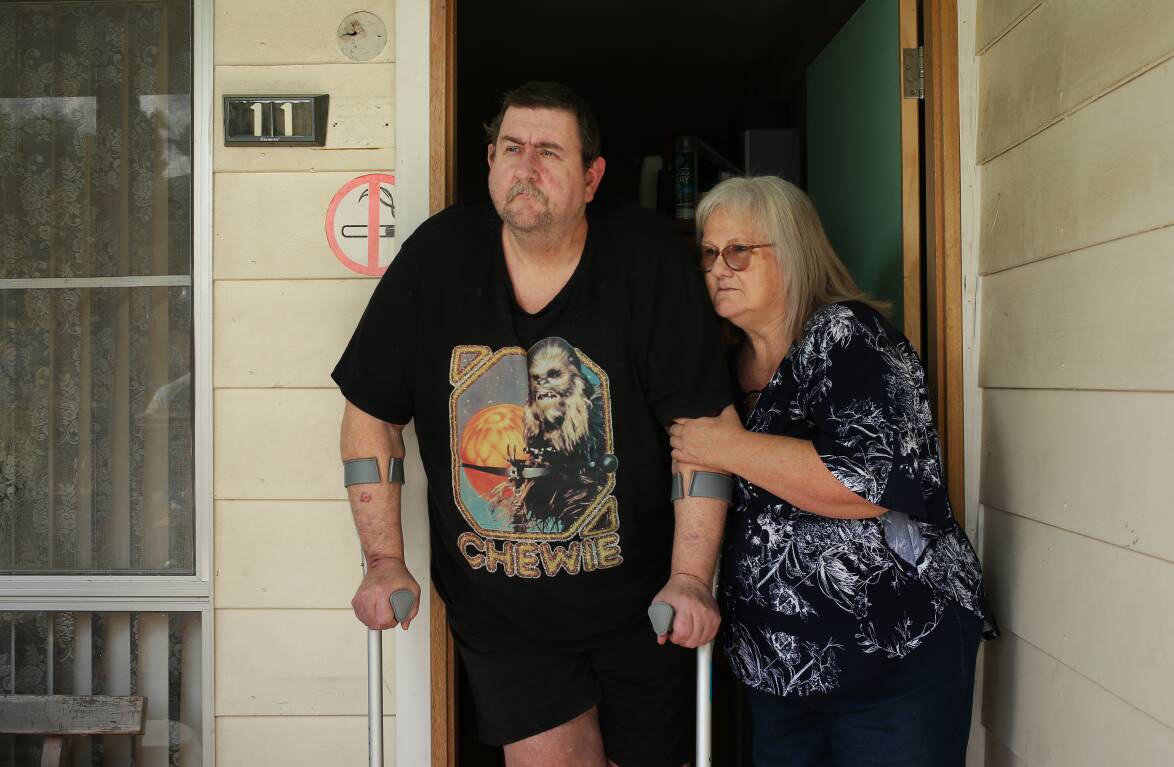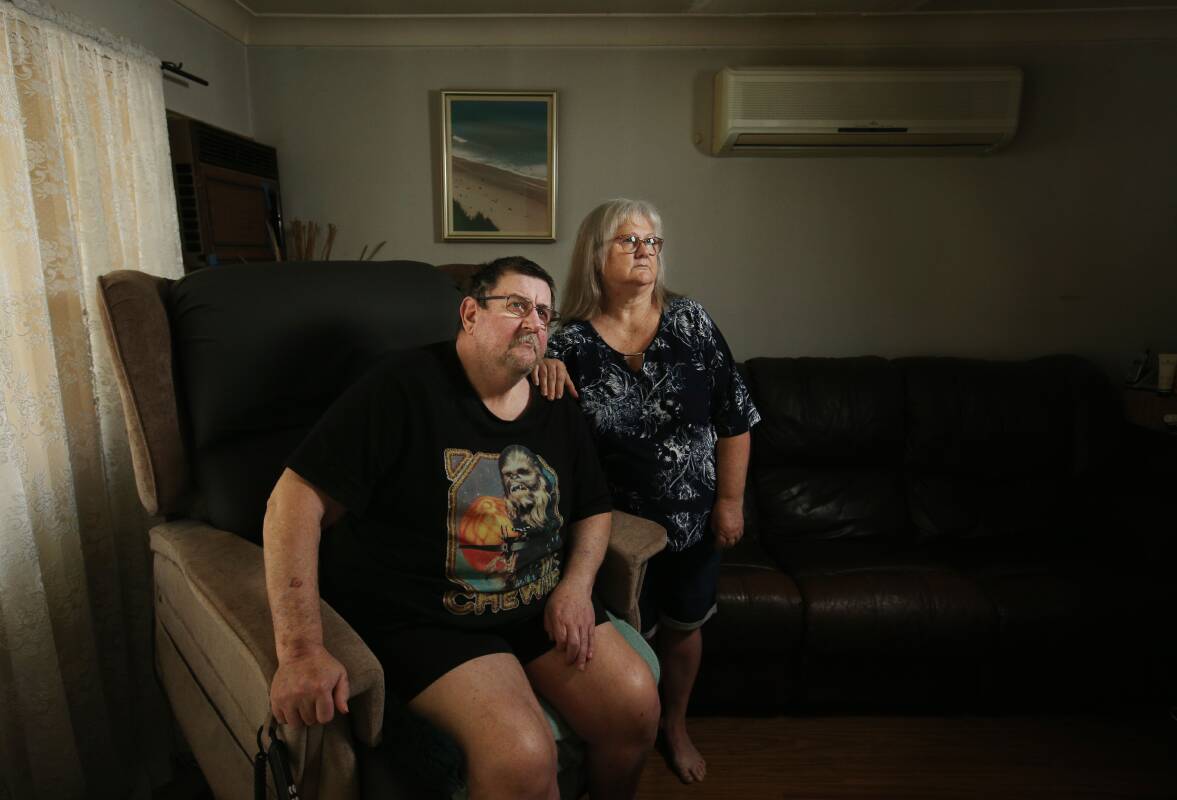

Lake Macquarie's Mark Codrington faces an 18-month wait to get a knee replacement at John Hunter Hospital.
Mr Codrington, 62, is one of 6923 people on elective surgery waiting lists in Hunter public hospitals.
That's according to the latest data from the Bureau of Health Information [BHI], which included 2539 patients on waiting lists for surgery at John Hunter alone in the October-December quarter - a 30 per cent rise from the same period the previous year.
The waiting lists for the region's other hospitals were: Kurri Kurri (2020), Belmont (950), Maitland (946), Calvary Mater (221), Cessnock (102), Singleton (74) and Muswellbrook (71).
Mr Codrington, of Mirrabooka on the Morisset peninsula, said his specialist told him to expect an 18-month wait for a knee replacement.
He believes this is "too long", given that he is largely incapacitated.
"I don't blame the doctors or hospital, I blame the previous government," he said.
"I'm hopeful the Labor government will improve the situation to reduce the waiting lists."
The Minns government announced a taskforce in March to tackle the state's elective surgery waiting list.
NSW Minister for Health Ryan Park said "it won't be easy to undo 12 years of the previous government's neglect of our health and hospital system".
"But we are determined to begin," Mr Park said.
He added that the taskforce will be "guided by preeminent clinical advice on how we can most effectively reduce those wait times".
The BHI data showed that 327 patients are waiting for a knee replacement in the Hunter, including 210 at John Hunter and 117 at Maitland.
However, the data also showed 52 knee replacements were performed at John Hunter and 30 at Maitland from October to December last year.
During that period, 4571 elective surgeries were done at the Hunter's eight public hospitals for various conditions.
Julie Tait, acting executive general manager of John Hunter Hospital, said the hospital performed "1677 planned surgeries in that quarter, an increase of 14 per cent from the previous quarter".
"We aim to ensure everyone has their surgery performed on time but acknowledge there may be a wait for some specialties in high demand, especially requiring ear, nose and throat (ENT), orthopaedic and gastroenterology services," Ms Tait said.
"We understand how upsetting it can be having a surgery delayed.
"We're currently looking at strategies to reduce surgery wait times across the district, including recruiting nursing and medical staff, working with our private partners through collaborative care arrangements where possible, and reviewing theatre capacity and outpatient waitlists."
Mr Codrington also had a hip replacement in December last year.
He struggled to get an appointment with a specialist in 2020 for his hip.
But after entering hospital for a fall in March 2021, he refused to go home without seeing a specialist.
"I got an appointment a month later and the specialist said it was the worst hip he'd seen in a while," he said.
The surgery occurred 21 months later.
"They told me it would be a 12-month wait for the hip and it took nearly two years," he said.
During this time, elective surgery in NSW was suspended for periods due to COVID lockdowns.
"When I had my hip done, my knee wasn't too bad. I was out and about with the missus," he said.
"Now my knee is ratshit. I can hardly walk again and I'm stuck at home. It's only the right knee at the moment. The left one needs doing too, but not yet."
After his surgery, Mr Codrington hopes to "get out and see the grandkids", including taking his 10-year-old grandson beach fishing.
The long waiting lists for surgery in public hospitals can take a heavy toll on patients like Mr Codrington, who have to live with pain and suffering.
"My doctor is trying to get me off the opioids," he said, due to new approaches to pain management and concerns about addiction.
"But they were the only thing keeping me active.
"Now I haven't got a life. All I do is sit around at home."
His long wait for surgery also affects his wife, Kim.
"It's not been good on her," he said.
Mrs Codrington said her husband requires her help around the clock.
"I have carer's burnout at the moment. I'm worn out and I've got no help," she said.
"It's a struggle for me because I'm not sleeping well because of the stress I'm under.
"I lay awake at 3am because I don't know if he'll call out to me.
"He can't even walk and he's in a lot of pain."
The couple, who are on disability and carer's pensions, said getting scripts for painkillers can be costly, given the GP crisis and lack of bulk billing.
"We had to do a phone consultation the other day because Mark couldn't get to the doctors.
"He was on the phone for less than two minutes and it cost $79. The scripts were sent through by phone."
She said her husband's two-year wait for hip surgery was tough.
"He slept in an old lift chair for eight months because he couldn't get in or out of bed.
"All his muscles deteriorated. He has to build them back up to walk, but he can't at the moment because of his knee."
Mrs Codrington said her husband's specialist "wants him to lose weight" for the knee surgery.
"He did lose 20 kilos, but it's harder for him to lose weight now because he can't walk."
AMA NSW president Dr Michael Bonning said surgery can be more difficult when it's delayed.
"Patients can put on weight and become less cardiovascularly fit, so they're not as fit to have their anaesthetic and need more rehab after," Dr Bonning said.
"All of these things get trickier when people are left to wait a very long time or find surgical services inaccessible."
Dr Bonning said big challenges remain in the public health system, "so everyone gets equity".
"So we have a system where no matter who you are, if you have a health problem, you can get access to services."
To share your story of being on an elective surgery waiting list or a wait to see a specialist, email dcronshaw@newcastleherald.com.au.
To see more stories and read today's paper download the Newcastle Herald news app here.







